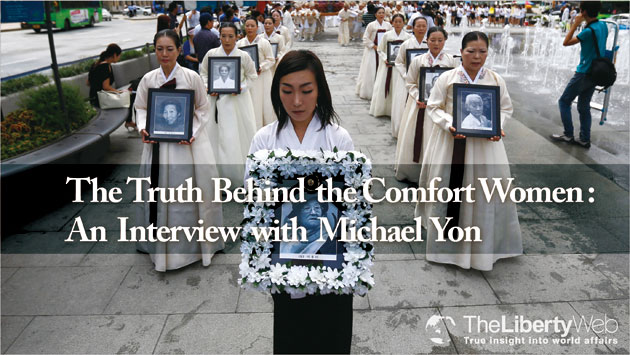Interview with Michael Yon: The Truth Behind the Comfort Women

Born 1964. An American writer, journalist, and photographer. Served in the US Special Forces (Green Beret) during the 1980’s. Michael has been writing from or about Iraq and Afghanistan since 2004, and has since written broadly ranging from the USA, Nepal, Bangladesh, Thailand, Philippines and more. He was embedded for several years in combat with US, UK, and others. His reports have been picked up by many outlets, including CNN, NYT, BBC, NBC, CBS, ABC, WSJ, and the LA Times to name a few, and is widely known and trusted.
Introduction
After 7 years of research by the United States government, there was no evidence of the forced prostitution of comfort women, the Nanjing Massacre, or Unit 731. Currently Michael is researching Chinese information operations directed against Japan, including allegations of widespread forced prostitution. We spoke to Michael Yon (M.Y henceforth) in an exclusive interview.
Q: You’ve been conducting research into the issue of comfort women for a while now. What is your conclusion?
M.Y: The comfort women program existed but there is no evidence of widespread sex-slavery of 200,000 Korean women.
What commander, during time of war with multiple nations, when Japanese Soldiers were starving, would dedicate resources to kidnap, transport, guard, and feed 200,000 sex slaves? The allegations do not even make sense.
An inadvertent self-insult by Koreans is that Korean men would allow 200,000 of their women to be kidnapped, yet Korean men did not raise a finger in resistance, but actually helped. This indicates that Korean men at the time were cowards and criminals. Did Koreans intend to imply this?
During our research, we found the “Final Report to the US Congress on Nazi War Crimes & Japanese Imperial Government Records” authored by the Interagency Working Group (IWG). Interestingly, few researchers seem to know about that report. The US government, under the Clinton and Bush administrations, spent 7 years and 30 million dollars to look into Nazi and Japanese war crimes.
The report was published in the spring of 2007. Out of millions of pages of newly declassified material, much of it related to Japan, and they were unable to find evidence of forced prostitution. They also looked for information about the Nanjing Massacre and unit 731, but found no smoking guns. Nobody doubts that there was a massacre in Nanjing, and nobody doubts the Chinese ability to exaggerate by orders of magnitude, and then to believe their own stories.
A Chinese organization lobbied for the IWG investigation. The “Global Alliance for Preserving the History of WWII in Asia” (Global Alliance henceforth). It should be noted that Global Alliance was closely associated with Iris Chang, author of “The Rape of Nanking”. Unfortunately, the author of the accusations, Ms. Iris Chang, was mentally ill and committed suicide.
Surprisingly, the IWG report offers an apology to Global Alliance for not finding anything.
But then Resolution 121 came out in the same year, in 2007, criticizing Japan and demanding an apology. And Obama, more recently, has made statements against Japan. Hilary Clinton also expects an apology from Japan. But they’re all disregarding the IWG report.
The idea that “the comfort women were forced into prostitution” is a false narrative. For example, in 1944, the Office of War Information (OWI) created “Report 49″. This report describes how the US captured 20 Korean comfort women in Burma. The women turned out to be prostitutes. The prostitutes, according to Report 49, were allowed to turn down any customer, and had a take home pay of about 9,000 yen/year. A full General at the time was making about 6,600 yen.
The OWI wanted to find dirt on Japan, but they did not find it with the comfort women. There is copious evidence that the women were recruited through newspaper advertisements in Korea.
And I know just from being in the army that prostitutes migrate to soldiers. We know that prostitution remains huge throughout the world, especially in Korea.
Q: Have you looked into the issue outside of the US?
M.Y: My office is in Thailand at the moment. I looked into the issue here. I talked with former Prime Minister Abhisit about this several months ago down in his office. He and his deputy said Thailand has no issue with it. They said Thais liked the Japanese when they were here. There is no anti-Japanese sentiment in Thailand. The worst crime that we found against Thais was when a Japanese soldier slapped a monk. Likely other things happened, but not enough to make ripples.
Also, it’s important to note that the countries that are making a big fuss over this are China and South Korea. As I’ve mentioned in my own blog (seen here), most of the other Asian nations generally have positive impressions of Japan.
Collectively, we conducted significant research in Thailand, Japan, California and New Jersey, the National Archives, and elsewhere. At the end of the day, I said well, we’re not going be very popular, but our verdict is not-guilty.
But remember, this is not about human rights or sex-slavery. This is about politics, money, and racism towards Japanese. In other words, this issue is a geopolitical tool that China uses to attack Japan.
Q: Why did you decide to look into the Comfort Women issue?
M.Y: The comfort women issue is a geopolitical tool. The IWG investigation was lobbied by the Global Alliance, but this organization is an information operation arm of the Chinese government. The ones that are fanning the flames of this issue in the US are the Chinese. China is trying to make the US, Korea, and Japan fight each other.
This is a big information operation. China recognized the opportunity to use this issue as a political tool. Asahi shinbun, of course, in 1982 came out and started reporting Seiji Yoshida’s story without thinking critically. And then Yomiuri shinbun, and who knows how many others got involved. Then at some point, the Chinese jumped on this issue.
China is encouraging this, using a Korean face and energy, putting up all these statues around the US.
Luckily, the Singaporeans and Australians did not allow this, but there is a reason why these nations are being targeted. China wants control over various areas, such as the South China Sea, the Senkaku Islands, and they want the US out of Okinawa.
This area is a major sea lane where much of Asia’s supplies pass through. If China can control this area, they can gain leverage against US forces in Okinawa and South Korea, and put a crack in the US-Japan alliance, in addition to other strategic advantages. So these are geopolitical reasons Chinese groups use Yasukuni, Nanking, and Comfort Women as three parts of a triangular attack.
On the Korean side, much of this is just racism toward Japan. And other people see this as a way to extort money from Japan. Then there is the Takeshima islands issue. This is clearly Japanese territory, but with Article 9, Japan is not in a position to do much about it.
Q: There seem to be many intellectuals even in the US who believe in the forced prostitution of comfort women.
M.Y: They point to derivative articles and say that there’s “evidence”. But most of them have not conducted primary source research. An Irish writer in Japan told me that for the past 14 years he has been writing about comfort women issues. I asked him “what kind of primary source document research have you done?” He said “none”. And this guy claims to have a PhD. Then I asked “have you read POW report 49?” He said “what’s that?”
Q: Why do Americans believe in Japan’s wrong-doing during the War?
M.Y: First, there was much Japanese wrong-doing during the war, so we should not gloss over that. To say that the comfort women issue is a fabrication does not absolve Japan from its own war crimes.
Second, the US targeted civilian centers during the war and firebombed Japanese cities, dropped two atomic bombs, and killed several hundred thousand people. That is at least part of why we tend to accept the stories about the comfort women and the Nanjing massacre. It is a way to rationalize the war. Otherwise comes the realization that the firebombings and the atomic bombings, were by any normal standards, war crimes. Racism towards Japanese – and dark skinned people in general, and against Jews and others, was severe in the US at the time. It is not as if Japanese were singled out. The USA was an equal opportunity racist. I hate to say this about the country I love, but this is the sad truth. For all the great sides of America, there are some very big, very dark realities that we would like to forget.
Another factor in warfare is that, and the US is really good at this, is dehumanizing your enemy. Using cartoons to make Japanese look like rats for instance. If we continue to dehumanize Japanese at least in the World War II era, we can give ourselves a free pass.
Then there’s the issue regarding Pearl Harbor. Anybody who has honestly studied Pearl Harbor knows that it was not a sneak attack. Historians know that we picked a fight with Japan, yet to say this angers many Americans. This was a struggle between various imperialistic nations, including the USA, Japan, Netherlands, France, UK, and more. Long before the Pearl Harbor attack, we were attacking Japanese forces with the Flying Tigers in China, for example. We worked with the Dutch on the oil embargo. We were prodding Japan to attack us for other geopolitical reasons, one of which being we needed an excuse to attack Germany. And to be straight, Germany needed to be attacked and defeated. Germany was making genocide into an industrial art. Hitler wanted Japan to help kill Jews but Japan saved Jews even when the USA was turning them away. This is unpopular to say in America, but true.
Q: Finally, what are your views on Yasukuni and Article 9 of Japan’s constitution?
M.Y: I visited Yasukuni twice, and paid respects twice. And I went there with a US military veteran, and he did the same thing. Yasukuni shrine is a private Japanese affair.
If a foreigner told an American president that he should not be able to visit Arlington because our people bombed his people in Cambodia, or Vietnam, or Korea, or maybe 50 other countries, we would not listen to them.
Japan needs to revise Article 9. This is not a popular thing to say at all in America or even in Japan, but Japan needs to be able to defend itself, fully defend itself, and not depend on the US. But also, on the larger scale, we also need to keep our US-Japan alliance as strong as possible.



















